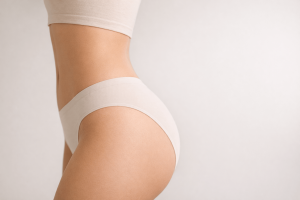Liposuction ranks among the most popular cosmetic procedures in the United States. Many people look for it as a way to reshape stubborn areas and enjoy a more defined body contour. But there’s a question that comes up often: what happens if you gain weight after liposuction?
It’s a fair concern, since weight fluctuations are part of life for most people. Understanding how the body responds in this situation can give you a clearer picture of what to expect and how to take care of your results.
That’s exactly what we’ll go over in this article!
How fat cells behave after liposuction
During liposuction, fat cells in the treated area get permanently removed. That means those exact cells do not come back. However, the body still keeps the fat cells that remain. When weight gain happens after liposuction, these cells can expand and store more fat.
The interesting point is how this change plays out in different parts of the body. Since fewer fat cells stay in the treated region, new weight often shows up in areas that did not go through liposuction.
💡For example, someone who had fat removed from the abdomen may notice extra fullness in the arms, back, or thighs if weight gain occurs.
This redistribution does not mean liposuction “stops working,” but it can shift the way results look. Patients usually notice that their contour remains improved compared to before surgery, but the overall appearance may change with significant weight gain.
Where the body stores fat when you gain weight after liposuction
When weight gain happens after liposuction, the body redistributes fat in a different way than before surgery. Since fewer fat cells remain in the treated areas, the body often stores new fat in regions that did not go through the procedure.
Common areas where fat may appear include:
- upper arms
- back
- thighs
- buttocks
- face and neck
Patients who had abdominal liposuction, for example, may notice the abdomen staying flatter compared to before, but other areas start to show more volume.
Below is a simple comparison of how fat storage can change:
| Area of the body | Before liposuction | After liposuction with weight gain |
| Abdomen | High accumulation | Less accumulation |
| Arms | Moderate | Higher accumulation possible |
| Thighs | Moderate | Higher accumulation possible |
| Back | Low to moderate | Can become more noticeable |
This redistribution explains why body contour may look different if weight increases. While liposuction removes fat cells permanently in the treated region, it does not stop the body from storing fat elsewhere.
At Smart Plastic Surgery in Miami, patients receive guidance on how lifestyle choices impact long-term results, including the importance of maintaining a stable weight to keep the body balanced after surgery.
Timeline of changes when you gain weight after liposuction
Weight gain doesn’t immediately affect your liposuction results. The changes typically follow this pattern:
Immediate changes (0-3 months)
Minor weight fluctuations of 5-10 pounds may not significantly alter your appearance. Your body continues healing, and swelling subsides during this period.
Moderate changes (3-12 months)
Weight increases of 15-20 pounds become more noticeable. You might observe changes in untreated areas first, while liposuctioned regions remain relatively stable.
Significant changes (12+ months)
Substantial weight gain of 30+ pounds can compromise your surgical results. The contrast between treated and untreated areas becomes more apparent.
Factors that influence weight gain after liposuction
Several elements affect how your body responds when you gain weight after liposuction:
| Factor | Impact on Results |
| Amount of weight gained | Higher gains create more noticeable changes |
| Speed of weight gain | Rapid increases are more problematic |
| Age at time of surgery | Younger patients may handle fluctuations better |
| Skin elasticity | Better elasticity maintains smoother contours |
| Overall health status | Healthy patients typically see better outcomes |
Health considerations when you gain weight after liposuction
Gaining weight after liposuction does not only change the way results look, it also carries health concerns that affect the whole body.
Extra weight can increase the risk of conditions such as high blood pressure, type 2 diabetes, and heart disease. The Centers for Disease Control and Prevention (CDC) reports that obesity rates in the United States remain above 40% among adults, showing how common these issues are.
Even small weight fluctuations may influence energy levels, joint health, and metabolic balance. While liposuction removes fat cells in certain areas, it does not protect against the medical risks linked to overall weight gain. For patients who invested in body contouring, this can feel frustrating, but understanding the health side of the equation helps maintain motivation to stay on track.
At Smart Plastic Surgery in Miami, surgeons highlight that liposuction is a contouring procedure, not a treatment for obesity or weight control. Patients receive guidance to focus on balanced eating, consistent activity, and regular checkups to support long-term well-being. This approach aims to maintain results while protecting overall health.
Can you reverse the effects of weight gain after liposuction?
Weight loss can help restore some of your surgical results, but the process requires patience and realistic expectations. The American Board of Cosmetic Surgery notes that patients who return to their post-surgical weight often see improvement in their contours.
However, skin that has stretched due to weight gain may not return to its previous tightness. In some cases, additional procedures might be necessary to address excess skin or restore optimal body proportions.
When to consult your plastic surgeon
Contact your surgical team if you notice:
- Significant changes in body proportions
- Uneven fat distribution patterns
- Concerns about your healing progress
- Questions about revision procedures
At Smart Plastic Surgery, we provide ongoing support to help patients maintain their results long-term.
Making informed decisions about future procedures
If you gain weight after liposuction and want to address the changes, discuss your options with a board-certified plastic surgeon. They can evaluate whether additional liposuction, skin tightening procedures, or other treatments would benefit your specific situation.
The key lies in understanding that liposuction provides a foundation for your new body contour, but maintaining those results requires ongoing commitment to healthy lifestyle choices. When you gain weight after liposuction, the changes are manageable with proper planning and realistic expectations about your body’s response to weight fluctuations.
If you are considering liposuction or want to understand how to maintain your results, the team at Smart Plastic Surgery in Miami offers personalized guidance and follow-up care.
Schedule a consultation today and take the next step toward maintaining your body contour with confidence.



